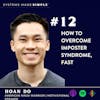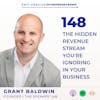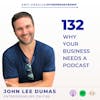How to Overcome Imposter Syndrome, Fast! with Hoan Do

On this episode of The AntiFragile Entrepreneurship™ Podcast, stress expert and business coach Courtney Elmer sits down with Hoan Do to show you what is imposter syndrome and how to overcome it, so you can stop feeling like a fraud in your business and truly leave your mark on the world.
Building self-confidence is one of the most critical skills for success as an entrepreneur.
But when self-doubt creeps in and undermines your progress, overcoming imposter syndrome can feel like an impossible challenge.
Lucky for you, today’s special and award winning inspirational speaker, author, and American Ninja Warrior finalist, Hoan Do, is here to give you practical advice you can use right now to build self confidence so you can do what you’ve been put on this earth to do and leave your mark on the world.
WHEN YOU FINISH LISTENING TO TODAY’S EPISODE, YOU’LL LEARN HOW TO:
- Overcome imposter syndrome and embrace your unique identity
- Cultivate and build the self-confidence of a seven-figure entrepreneur
- Flip the self-doubt script so you can get paid to do more of what you love
- Start building a legacy and leave your mark on the world
_____________
Liked this episode? Pay it forward and share it with a friend.
Love the show? Write a 5-star review — even one sentence helps us keep bringing you the content you want to hear.
More from Courtney:
- Website: theeffortlesslife.co
- Instagram: @thecourtneyelmer
Some product links on this site are affiliate links, which means we'll earn a small commission for any affiliate purchases you make (at no additional cost to you). We only recommend products that we use and/or personally trust, so you can browse with confidence.
All Rights Reserved | © The EffortLESS Life®
You're listening to the AntiFragile Entrepreneurship™ podcast, Episode 12.
You're gonna love the powerful story that you are about to hear about a man who came to America with his family as a young boy to escape the Vietnam War. I'm really thrilled to introduce you to our special guest Hoan. Now, Juan is an award winning inspirational speaker, author, and he's also a city finalist in nbcs. hit show American Ninja Warrior, like come on. So crazy, right?
He's so accomplished. He's been recognized as the best youth mentor by the International examiner and travels across North America speaking at colleges, conferences and companies, giving them practical advice that helps people develop resilience and grit. That's because from an early age, Hona understood the sacrifices his parents had made and their journey to the United States. He worked hard because he wanted to make his parents proud because he felt indebted to them for their courageous pursuit of a better life. And so he vowed to make sure that one day he'd be able to take care of them.
While he had a lot of success here in the States, and his hard work took him to Malibu, where he attended Pepperdine University. But that's when he hit a low point, like he had never experienced before. And I'm gonna let him tell you the full story. I won't give it all the way. But it came down to a decision. And in that moment, he made a decision that completely changed the trajectory of his life, shifted his belief that hard work and hustle, and how to overcome imposter syndrome is necessary for success. And that decision was the catalyst for his career today where he speaks and teaches others how to leave their mark on the world and make an income and impact through speaking--teaching how to overcome imposter syndrome and build self confidence. I am so excited for this one guy, because Hoan shares some powerful, practical advice that you'll walk away with after listening to this episode and be able to instantly apply it to your life and know you're gonna love it. So without further ado, I bring you the one and only Hoan Do.
[INTRO TRACK]
Courtney Elmer
Hoan, welcome. I'm super excited to have this conversation with you today. And for those listening. And I met back at business by design live this past October, which is a James Wedmore event. And it was just super cool to get to meet you there and to hear a bit about your story. And I'm excited to dive into that and hear even more about it today. So if you wouldn't mind, why don't you just start by sharing with us who you help and how you help them?
Hoan Do
Yes, so for me, I help individuals that have a message to make an impact and income inspiring students as a paid speaker.
Courtney Elmer
I love that. I love that and what inspired you to start this business and particularly why students why the youth so I've been speaking for the last decade now. And I knew when I was a high school Jr. That this was my calling while I was supposed to do where I attended a conference and the speaker impacted my life but 300 other students as well. And everyone wants to say that, you know, I want to make a difference in this way.
Hoan Do
I want to help people but a lot of people don't know how at that moment. It clicked for me that if I were to do this, I can help more people speaking in my lifetime than just having tons of one on one conversations and giving advice. So the last decade I’ve been traveling across the country working with companies, organizations, schools, to help build more resilient individuals. And for me, I come from a family that escaped the Vietnam War. We came here with nothing. I grew up in the most dangerous cities in the entire country. And I had a chance for scholarships and financial aid to attend Pepperdine University down in Malibu, California.
I struggled in school and I was thinking, why don't they share the tools to help you succeed in the real world? How do you overcome imposter syndrome? How do you build self confidence? Like, how do you deal with personal finance? What about relationships, time management, but you're doing about teaching individuals not being overwhelmed dealing with stress?
So that's where my inspiration started with students, because that's when I got the message, it really changed my life. And then now that I know, with getting ready to start a family in a couple years, I travel about a third of the year, I love what I do, I feel it's my calling. With that being said, I know family life is so crucial. One of my mentors said, no amount of success will ever compensate for failure at home. So knowing that mom drove this much, I want to make sure it's not about me, I can help other people share their message and make an even bigger impact. Because there's people out there that have stories, like yourself, overcoming cancer, that you can resonate with other individuals, I'm not able to.
Courtney Elmer
And it's just so powerful too. And being a junior in high school, realizing this first and foremost, and most of us, you know, we're in high school, just like thinking about, you know, who our latest crushes are, and what's going on there. You know, and trying to like the life stuff has not really occurred to us yet. But for you, it was very early. And you know, your story of just you know, how your family came to America. And you know what growing up was like for you. And also, you know, as you got into college, just reading a little bit about, you know, your journey. And what I've learned, I would love for you to dive into this some more to is the pressure you were putting on yourself, you know, to grow and to succeed, and how that really became the catalyst even more for what you do now and really equipping the youth and students with these real life skills, which I believe is just so important.
Hoan Do
Yeah, definitely. So I mean, I think innately, every child wants to make their parents proud, and had this very distinct moment where a study abroad in Florence, Italy, everything looks great on the surface, we'll get 3d weekends, we travel different countries. And 90 something percent of my luggage was personal development books, and real estate investment DVDs, I wanted to be financially made, I helped my parents and I put all this pressure on myself and I procrastinated on this paper and learned how to overcome imposter syndrome and build self confidence. And we had about 40 other students in the same boat, we're stuck in this cramped room reading this paper out. If you can imagine a time lapse. And this is a clock that goes from 12 to one one to two, every hour, one seat would leave the room because they're done with another student.
At the end of the morning, I was the only one left to have one page written out of eight. And that was like the straw that broke the camel's back where I was so stressed. so overwhelmed. It felt like someone took a baseball bat and slammed it to the side, my head and my head was constantly throbbing, I didn't know who I was. I suffered with how to overcome imposter syndrome. I didn’t know how to build self-confidence. And it reached a critical point where I was walking on a bridge over this river, I think I could easily just walk off and this pain, but it took a caring adult that reached out to me, and he noticed something was wrong.
And he asked me what's up and we said, I said I just wanna make my parents proud. And he says, Every parent, all they want is for you to be happy. And in that moment it clicked. Because my parents didn't have much. So coming here in education, and then getting the job and having money you don't have to struggle. And every parent I've learned does not want the kids to have to go through the challenges they did, they want them to do even better. They clicked in my head that my parents don't want happiness. Success says we have two different definitions. So when I have the chance that I work with parents, and I share the news, having the patience with their child, and I when I talk to students or the youth say hey, you know what? anything in life when things challenge you, you gotta keep pushing through and the same things connecting your parents all throughout their lives. And also when you get to that certain stage, middle school, high school, you're too cool your parents. And I realized that problems happen. Not because we communicate too much but because we don't communicate enough. And so for me, I had that breakthrough where my parents and I disagreed And what happened looks like, but I realized I had to share with them and be vulnerable as Hey, no, this is my passion. I don't want to have this resentment towards you. I need to follow this path. And the best thing you can do to help me is encourage me if it doesn't work out, I promise you, I'll do this other thing. But I need to do this for me. And so when I had a chance to work with moms and dads to say you know what? loving your child, they need unconditional love and support, and let them make their own mistakes, you know, and that's one of the toughest things to do. Because it's like, dude, I've been towards this path. Don't do this. But that's where I have the chance to work. It's like, Oh, I'm this cool, younger person. I share the exact same thing every parent shares the same message from a different messenger.
Courtney Elmer
It's amazing how powerful that is hearing it from a third party, right? Not not from their parent who they're like, No, I'm too cool for but from you, who really gets them and who understands them and who I would imagine is young enough to a point where it's like they relate with you a lot more than they would maybe even relate to their parents or they hear it differently. And even in listening to you talk right now, one of the things I'm noticing is this beautiful ability, you seem to have to when life happens when you're in these intense moments of stress or overwhelm. It's like, you can zoom out and see the perspective, right, the whole picture. And that's a skill, that is something that people can learn how to do. It's not something that often comes naturally. But your ability to do that, and then to be able to communicate that and what's really going on there.
And those lessons and those takeaways, you know, from your experiences that you've learned and be able to pass that on. And such an empowering thing and helps us overcome imposter syndrome. And I would imagine that the audience you speak with really picks up on that, and values that and appreciates that. So just I love the work that you're doing. Yeah, hundred percent. So I'm curious about you know, okay. So you have these realizations, you know, you realize that, okay, there's a different path. I can empower more people, I can have a bigger impact, I can share what I've learned. And so you start your business, you start speaking, what did that look like for you? And what were some of those, maybe even the mental obstacles, those roadblocks that we all experienced that self doubt, that came up for you? What did that look like? What was that voice saying? Did you learn how to overcome imposter syndrome at any point? Did you learn how to build self confidence?
Hoan Do
Yeah, so my constant thing was never good enough, and how to overcome imposter syndrome. I didn’t know how to build self confidence. And for me, I had been very intentional with a lot of my life in college, I got immersed in Tony Robbins, and I worked as a speaker for Tony Robbins after I graduated. I learned a lot, including how to be a speaker.
It's also about leading others down the path that you have been along. And I think you know, so many people listening can relate to confidence issues and how to overcome imposter syndrome; that voice that tells you you know, you're not good enough, who are you to be doing this, you're not cut out for this, you know, you don't have the experience or whatever it is the skill set. You don’t know how to build self confidence. And I think that stops a lot of people right there and they don't go any further. But like you said, surrounding yourself with a team of people who can support you and help you see past the obstacles that maybe you can't see on your own and how powerful that really is. And also realizing that to be a leader, you don't have to have it all figured out. You don't have to have the perfect life and all the answers. You just have to be a couple steps ahead of the people that you're leading. This is how to overcome imposter syndrome and build self-confidence.
And you know, it's I'm always a person that preps so before we met and went to Tony Robbins conference, multiple marriage retreats, all that good stuff. And for me, it's that's the progression of personal life. But that ties into my professional life is that, again, I know that being on the road, a third of the year, is not conducive to being an amazing husband and amazing feature father. So for us, we started youth speaking on pro.com, which is a platform to help people take their message, and to make that impact inspire people to pretty much create their life as a paid speaker.
Courtney Elmer
And so your plan is to leverage that, which I'm imagining gives you that more of that time, freedom, you'll have to be on the road as much. And then you can be that present husband that present father that you want to be
I'm going to ask you a question here and just share whatever first comes to your mind. What kind of fears does that bring up for you? Because I would imagine, you know, and this is me looking from the outside, but that you've had, you know, all this success, this experience, life is good, like things have gone well for you and your business. And now you're about to make a bit of a transition here with the potential to have another job, another role that you've not had before. What does that bring up?
Hoan Do
I'll tell you this. That's a great question where you mentioned the voice in your head, and I use the metaphor of a playlist. If you have your favorite song going, you'd have the worst day but you're jamming, turn into song up, any stress melts away. But if that song comes on, the next one is horrible, annoying is going to kill the mood. So for me, the waxhaw that can come up is like oh, but this is a new thing. And what if this doesn't work. And for me, I have to constantly change my playlist. And the other technique I share, I share it with your peeps, as you simply say, we're hands on like this, you say, hold up, that is wack.
And it sounds silly. But it works. And we've done this to crowds of up to 5000 people where people standing up chanting this out. Because when you physically engage your body, and you say something like that, it changes the way you feel. And usually you're light hearted, to think clear. And clear, you make better decisions. And when you're stressed out. And when you’re trying to overcome imposter syndrome and build self confidence. So for me, my wax song is like, this is kind of scary. It's like you're starting over again.
And if I were to make a metaphor, it's kind of like, if you have a job, and you're working on that passion project, that thing you always wanted to do. And but then you think it was kind of scary, because this is new, this is different. But my job is so comfortable. Let me go back to this. Well, for me, I can say my speaking career is so comfortable. It's like a job. This is a new venture. And I have to constantly change my playlist to remind myself, Hey, want just like anything, to get good at anything. At first, you're not that great. But when you put more time into it, you get better, you get better than more coffee. And this is what I learned from Dan Sullivan, from a profile Strategic Coach, cause it is foresees A lot of people say you know what, I would do this if I was more confident. But you don't start off with self-confidence. You start with one and make a commitment. That’s how to overcome imposter syndrome and build self-confidence.
You know what, I'm scared, but I'm gonna do it anyway, it's kind of a muscle, the more you work out that muscle stronger gets, the easier it gets. I want to have the commitment and then to the courage to pursue this avenue, this passion project. Once you have the courage to pursue it. Also you learn you gain competence, from the competence, you build self confidence. So that formula, it starts with making that commitment. So for me, by sharing with different people, by enrolling students and coaching people, it constantly helps me to move forward that direction. Rather than staying in that comfort zone, where nothing happens that is great or different. That's happening in my life now.
Courtney Elmer
You're bringing it all back to how to overcome imposter syndrome and build self confidence. I'm smiling right now. And our listeners can't see me but I'm a graduate Strategic Coach, too. And I'm like, Ah, yes. So good, right, and just breaking it down into these practical ways to wrap our mind around what's really going on there. And that analogy of the playlist is so onpoint because we get that soundtrack playing in our head and it's the one that's negative and it's the one that takes us down a bad path, the one that's going to keep us stuck and spinning our wheels and overwhelmed and stressed. We've really got to call it out and it's about cultivating that muscle developing that skill, that awareness to say Hold on a second, this is not I need to admit change this mixtape, you know, put a new play a new track on to play and that's really you know, at the heart of it, you people ask me limiting beliefs and how do you get into changing that and you know, what, how do I recognize that and really, it's about awareness. How do I overcome imposter syndrome and build self confidence?
And then just trading out the old belief or a new one. You know, if you were to say it really simply in a nutshell, and that analogy is a perfect example of that and a great one. It's such a fun one to remember. I love how you said that. Awesome. So okay, I would love to know, on your journey, you know, one of the biggest mindset shifts that maybe you had, you know, I know you mentioned this idea of not being enough and that self doubt and how you overcome imposter syndrome. How did you build self-confidence? Was there anything else that stood out on your journey that was maybe an obstacle limiting belief that once you realized it, you were like, whoa, are you kidding me? That's what's been holding me back for a while and how you traded that for a new belief? Can you kind of walk us through what that was and what that might have been? Essentially how did you overcome imposter syndrome and build self confidence? Share that with our audience.
Hoan Do
You know, I think what you're doing is so incredible, and it aligns with what you're doing, where a lot of people think that kind of just hustle more and work harder. And that was a mindset shift that happened to me a couple years back, where I was in a mastermind group, and we're down to Mexico with people who used to be part of Tony Robbins Platinum program, which is like $60,000. mastermind. And they created their own thing, and I got invited there, and I was on the bus. And what was really neat about it was that everyone was there. They have their families, it was a family experience. And I was sitting next to a gentleman who's very successful, his company in Australia, is considered the number two company behind Google as the place to work with a 10 million plus dollar company. And he sits down next to me, and he says, One, how's it going? How's it doing? Great, hey, what are your goals next year? And it's not? I like to do this, this and this.
He said, Well, let's imagine let's play bigger. He says, imagine you have a million dollar business. And he said to me, what do you think you need to do to reach this goal? Did you build the self confidence to get there? I said, I'll find your hire coach, that's our marketing, I listed all these things. And he said to me, no, he said, none of that work. He said, whatever you're doing now, you have to let go of and do everything completely differently if you want to grow that much. If you want to move forward in life, you can't keep looking backwards, you can't look in the rearview mirror. And that was a shift--it’s about how to overcome imposter syndrome. It’s about how to build self-confidence. For me, it wasn't just about working 24 hours a day.
Courtney Elmer
I love specifically what you said about letting go of things as well, because something that I see a lot is people think they're doing things differently by trying this new productivity hack, or this new time blocking strategy, or this new way to organize things and get their business where they feel like they're in control. When really it's about this idea of letting go of that control, how to overcome imposter syndrome and build self confidence, which is what propels your growth. And a question that I asked myself often is, am I holding on to this because I have to do it like am I literally the only person that can sign this document? Or you know, things like that? Do I actually have to do it? Or am I holding on to it because I'm afraid of what'll happen if I am not the one doing it? That's like someone that just puts things in perspective.
What would you say to those people then that are like okay, but I'm just in the beginning stages of my business like I feel like I have to do all this I don't have the financial resources you know, all those all these other excuses that might be coming up as to why they're unable to let something go. How would you tell them to overcome imposter syndrome and build self confidence? What words do you have for them?
Hoan Do
I would say if you don't think you can do it, what can you do? What's that baby step? Because there's a saying that I shared with you recently that is better than perfect. So what's so you can't afford a full time assistant? But hey, you know what, how about you? rather than spending that 2050 bucks on cost for the week and just track for one week? Let me see if you know the highest one for this one week to see if it makes my life easier if I feel better. Try it out. It's like trying out a buffet. Just taste it for a moment. See if it works, because a bob is just about priority. Do you really want to slot people in when they set goals? I want this. It's not about wanting or what are you willing to do? Are you willing to let go some of that stuff?
I would say if you feel like you can't do it, it's probably because you should do it. And the more you keep resisting it, the more you'll keep on continuing your life. So try getting that person to go ahead and hire for a couple hours a week. If you feel that's too hard. Go find an intern, an unpaid intern who has a family member, they'll volunteer their time, the key is not about focusing on what your resources are, you don't have to be more resourceful being creative, because you don't have to pay somebody you can barter.
Courtney Elmer
So what's one tip that you have that you would want to leave those listening today out there with for those that are struggling with that stress? How do you overcome imposter syndrome and build self confidence? That overwhelmed feeling like you did a couple of years ago that I've just got to work harder to be successful, and you've dropped a lot of awesome value already today, if there was like one little line or sentence that you could put in for someone to take away with the bumper sticker version? What would that be?
Hoan Do
If you want to lower your stress? Learn how to control your PMS. Now some of you are thinking right now like oh, no, he didn't. When I did go there. PMS stands for your physical, your mental, your spiritual health. If you feel a little stressed out, pay attention to how you're moving your body. How do you know? Because we all have done it before. When we're stressed physically, there's certain things we're doing with our body. So the next time your stress position where you if you're sitting down and you're working on that passion project, what you're doing, like, oh, man, I can't think clear, maybe it's because you're sitting down here, diaphragms, collapse, maybe standing up going for a walk. That's why they say whether you're doing yoga, going on a run, or changing the physiology of the body increasing their cortisol levels. So number one, there's some stress, move, impact and change your fiscal health to your mental health is your attitude. Change that playlist by saying Hold up, that's wack. Change that playlist and the song in your head? And lastly, is your spiritual health. Take care of you carve out that time. I know if you're super busy.
And if you have parents listening, I can only imagine but I compare it to. It's like an engine, checking the light for a car. If you're driving your car and your check engine lights on, a lot of people know they need to pull over. So why is that so many of us will get overwhelmed with life being a parent at work, we're stressed, we know we should pull over. But we don't. And unfortunately, many people if you don't pull over, you will break down like a car except you'll break down physically, mentally and emotionally. So I encourage everyone to make sure you take time for you. It's kinda like charging your cell phone, right? You have a lot of apps running on it. It's draining the battery. That's the kids. That's the word that's everything in life.
Courtney Elmer
I think about what I'm grateful for with my devotional reflection on my goals. So that when I wake up, and I take on the day, I'm not reacting to life, but I'm charged about 100% so when things come in, I'm like bringing a problem. Almost like this for breakfast, while your stress your physical, mental, spiritual health so important, you know, I always say there's a human behind every business, you know, every career, every job that's out there, you, it's dependent on you that job that career that business is not going to grow and thrive unless you are growing and thriving. And you know, as a mom of a very busy two year old little boy, I can say that, you know, starting off in my journey of motherhood, yeah, it was stressful. It was overwhelming. It was daunting, I had to figure it out. But the one thing that I held on to and that I always knew, without a doubt was that if I took good care of myself, it would allow me to show up as the mother and the wife that I want to be and that I know I'm capable of being. Yeah, so important. Well, the last question I have for you today, one, and this is one that I ask everyone that comes on the show, I'd love to hear what is your definition of success?
Hoan Do
You know, for me, success is not about a result. More as it's the effort of giving 100% everyday to all of yourself so that when you go to bed at night, you know, you gave everything you had. It’s about learning how to overcome imposter syndrome and build self confidence. Because for me, one thing I learned about goals and success a lot of people or a song people have is that not when I get this thing that I feel proud that I feel loved, I will feel important. But one of my mentors sent me one, the purpose of every goal is not to achieve it. The purpose of every goal is that by pursuing that thing, you not only pursue who you become, what you learn, the consequence of that is the reason why your goals achieving it is just the cherry on top. So for me, it's about giving your all to become a better human being, progress over perfection, and achieving that end result. If you get it right, but either way, you're at a far better place by pursuing those things. And not and that for me is success.
Courtney Elmer
Well, that is the most perfect note to end on. I couldn't think of anything better. You’re very thoughts on how to overcome imposter syndrome and build self confidence. Thank you guys so much for tuning in on how to overcome imposter syndrome and build self confidence. And we'll see you here next time on the AntiFragile Entrepreneurship™ podcast.








